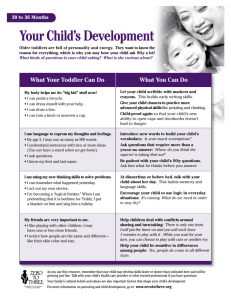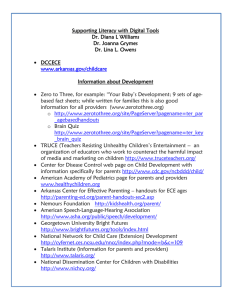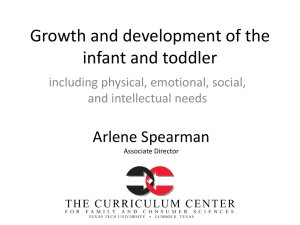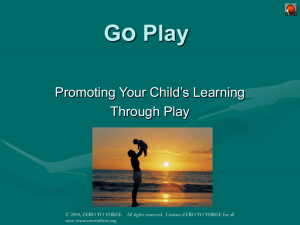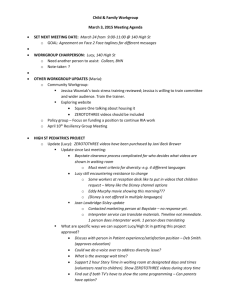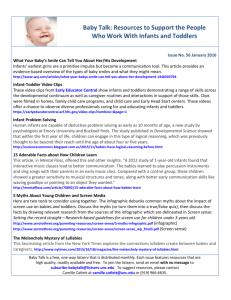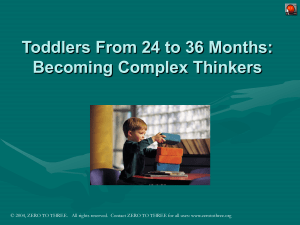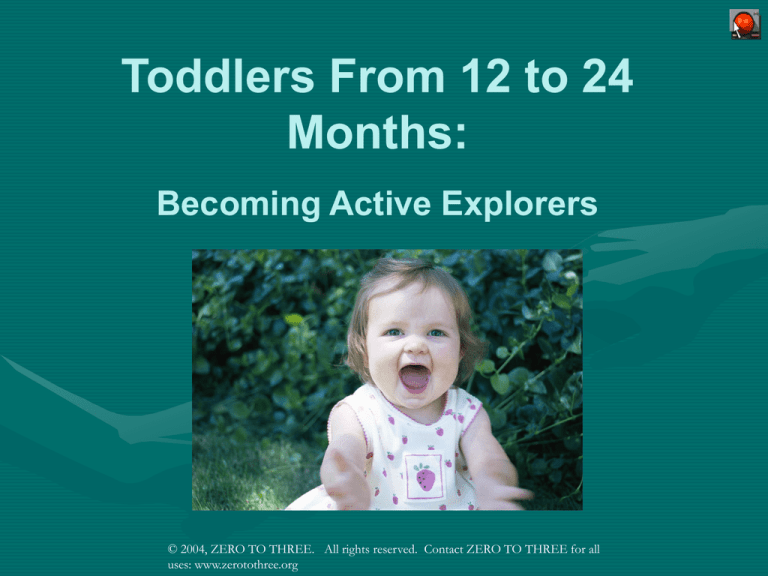
Click
Me!!
Toddlers From 12 to 24
Months:
Becoming Active Explorers
© 2004, ZERO TO THREE. All rights reserved. Contact ZERO TO THREE for all
uses: www.zerotothree.org
Click
Me!!
Learning Through Play
Play promotes all areas of a toddler’s
development:
– Physical
– Intellectual
– Communication
– Social
© 2004, ZERO TO THREE. All rights reserved. Contact ZERO TO THREE for all uses: www.zerotothree.org
Click
Me!!
Learning Through Play
• Physical Development
– As toddlers become more adept at using
their new balance, coordination and
muscle strength, their physical skills will
become more complex as well—moving
from walking to running, jumping,
climbing, dancing, and pedaling.
– When toddlers play, they have the
chance to practice new “tricks” and to
learn more about what their body can
and cannot do, all under the supportive
(and supervisory) eye of a loved adult.
© 2004, ZERO TO THREE. All rights reserved. Contact ZERO TO THREE for all uses: www.zerotothree.org
Click
Me!!
Learning Through Play
• Intellectual or Thinking Skills
From age 1 to 2, toddlers are “do-ers”—they want to
make things happen!
You will see your child acting with a goal in mind,
whether it is climbing on top of the kitchen table or
getting a block tower just right.
© 2004, ZERO TO THREE. All rights reserved. Contact ZERO TO THREE for all uses: www.zerotothree.org
Click
Me!!
Learning Through Play
• Intellectual or Thinking
Skills
As they play, they are also
testing the properties of
objects—what bends, what
snaps, what bounces, what
sinks, what floats.
While this can be messy,
exploration like this helps
children better understand how
the world works. (P.S.: Time to
child-proof!)
© 2004, ZERO TO THREE. All rights reserved. Contact ZERO TO THREE for all uses: www.zerotothree.org
Click
Me!!
Learning Through Play
• Communication Skills
Your toddler can probably tell you exactly how
she is feeling through her cries and gestures,
but will increasingly start to use words to
communicate.
As your child plays, you can promote her
language development by talking about your
game, her toys, and the world around her.
Encourage pretend play (“role-playing”) when
she is ready, as dialogue flows naturally from
these acted-out stories.
© 2004, ZERO TO THREE. All rights reserved. Contact ZERO TO THREE for all uses: www.zerotothree.org
Click
Me!!
Learning Through Play
• Communication Skills
Some common errors you may hear from your child
include incorrect plurals (one foot, two feets) and overgeneralizing (calling all dogs by your dog’s name).
You may also hear a lisp or other speech problem. Many
times these go away as your child matures, but if you
have questions, talk to your child’s health care
provider.
© 2004, ZERO TO THREE. All rights reserved. Contact ZERO TO THREE for all uses: www.zerotothree.org
Click
Me!!
Learning Through Play
• Social Skills
Toddlers develop social skills as you show your
enjoyment in spending time with them—this
makes them feel fun to be with, loved, and
special.
Through play, you can help your child practice
turn-taking, sharing, and cooperation.
© 2004, ZERO TO THREE. All rights reserved. Contact ZERO TO THREE for all uses: www.zerotothree.org
Click
Me!!
Learning Through Play
• Social Skills
At this age, playing with peers
often means parallel play, in
which children play next to,
but not with, another child.
This is normal and is an early
friendship-building
experience, as children watch
and imitate others.
© 2004, ZERO TO THREE. All rights reserved. Contact ZERO TO THREE for all uses: www.zerotothree.org
Click
Me!!
Ways to Promote Your Child’s
Development Through Play
Make movement activities part of every day.
Possibilities for play grow by leaps
and bounds for your young toddler!
Look for games that encourage
movement and help build on
new physical strength,
coordination, and balance.
Physical skills are taking off as your
child learns to stand on two feet,
walk forwards and back, and even
jump, run, and climb.
© 2004, ZERO TO THREE. All rights reserved. Contact ZERO TO THREE for all uses: www.zerotothree.org
Click
Me!!
“Bathe” your child in language.
Your child is beginning to communicate
better with gestures, sounds, and—
increasingly—words.
To help your child learn language, use
language. Talk with your child. Tell
him when you will be leaving for child
care, what he will have for lunch, what
you will play together after dinner.
© 2004, ZERO TO THREE. All rights reserved. Contact ZERO TO THREE for all uses: www.zerotothree.org
Click
Me!!
“Bathe” your child in language.
You can also:
Use words to describe what he is seeing and
doing: “Wow, you pushed your car a long
way! Let’s have a race.”
Use words to describe his emotions: “You are
really sad that we have to leave the
playground.”
Read and sing to your child. Books and
songs introduce your child to lots of new
words and ideas.
© 2004, ZERO TO THREE. All rights reserved. Contact ZERO TO THREE for all uses: www.zerotothree.org
Click
Me!!
Learning Through Everyday Moments
Marshall, an 18-month old, was playing with a
jack-in-the-box. He was trying to turn the crank
and was having difficulty. He simply couldn’t
get the “jack” to pop up. He started to bang on
the box. He knocked it over, frowned, and
babbled to himself.
He kept looking back and forth from his mother to
his toy. She came over and sat on the floor
next to him. “Can’t get jack to come out and
play?” she said. She slowly turned the crank
and sang, “Round and round the cobbler’s
bench, the monkey chased the weasel. Pop
goes the weasel!” Up popped the jack.
© 2004, ZERO TO THREE. All rights reserved. Contact ZERO TO THREE for all uses: www.zerotothree.org
Click
Me!!
Learning Through Everyday Moments
Marshall clapped and reached for
the crank. His mother gently
took his hand away. “Just one
minute,” she said, as she
pushed the jack down again.
Taking Marshall’s hand, she
helped him turn the crank and
then let go so Marshall could do
it himself. Soon the jack
popped up and Marshall
beamed with pride. “Nice job,
little man,” his mother said.
© 2004, ZERO TO THREE. All rights reserved. Contact ZERO TO THREE for all uses: www.zerotothree.org
Click
Me!!
To Think About
•
How does Marshall tell his mom that he is feeling
frustrated? How does she respond?
•
How does Marshall’s mom help him learn how the jackin-the-box works?
•
When do you think a parent should step in to help a
child when they are struggling with a toy or a new skill?
•
What are other ways a parent might respond to a
child’s frustration? What might these different reactions
communicate to the child?
© 2004, ZERO TO THREE. All rights reserved. Contact ZERO TO THREE for all uses: www.zerotothree.org
Click
Me!!
What Was Marshall Learning?
• Social-Emotional Skills:
Marshall is learning that he can turn to his
mother when he is feeling frustrated and overwhelmed. This develops
his trust in others.
He also learns that he is smart, capable, and can do things on his own
when his mother lets him turn the crank by himself.
When she labels his feelings, he feels understood, and learns to
identify and manage his own difficult feelings.
When his mother responds to his calls for help, he is also learning
about empathy.
© 2004, ZERO TO THREE. All rights reserved. Contact ZERO TO THREE for all uses: www.zerotothree.org
Click
Me!!
What Was Marshall Learning?
• Language and Communication Skills:
Even without words, Marshall is able to let his mother know
he is having a tough time with the jack-in-the-box by
using his gestures.
When she responds, he learns
that he is an effective communicator,
which motivates him to keep on
communicating.
He learns new words when his mother
uses language to describe his feelings.
© 2004, ZERO TO THREE. All rights reserved. Contact ZERO TO THREE for all uses: www.zerotothree.org
Click
Me!!
What Was Marshall Learning?
• Physical Skills:
Marshall builds the fine muscle
skills needed to turn the crank on
the jack-in-the-box. These same
muscles in the hands and fingers
will help Marshall learn to draw
and write later on.
© 2004, ZERO TO THREE. All rights reserved. Contact ZERO TO THREE for all uses: www.zerotothree.org
Click
Me!!
What Was Marshall Learning?
• Thinking Skills:
Marshall is learning cause and effect when he connects the
act of turning the crank with the jack-in-the-box popping
up.
He is learning about patterns (an early math skill) when he
anticipates that at the end of the song, the jack will come
up.
© 2004, ZERO TO THREE. All rights reserved. Contact ZERO TO THREE for all uses: www.zerotothree.org
Click
Me!!
Thinking About Your Baby
•
•
•
•
How does your child tell you when he/she is
feeling frustrated?
How do you feel when your child gets
frustrated? How do you manage your own
feelings when you see him having a hard time?
What do you do when your child is frustrated?
Think of a time when you helped your child
learn something new. What did you do? How
did he/she respond?
© 2004, ZERO TO THREE. All rights reserved. Contact ZERO TO THREE for all uses: www.zerotothree.org
Click
Me!!
Questions About Babies and
Play
• I have twins who are 14-months
old. One plays the same thing
over and over, while the other
switches toys every few minutes.
Is this normal?
© 2004, ZERO TO THREE. All rights reserved. Contact ZERO TO THREE for all uses: www.zerotothree.org
Click
Me!!
Answer: Individual Differences
• Young toddlers explore toys and other objects in
their world in different ways. Some children like
to sit and explore one or two toys in a very
focused way, working hard to figure them out.
This repetition helps them learn.
• Other children are more movement-oriented,
preferring to move from toy to toy, touching,
shaking, bouncing, throwing, and then moving
on.
© 2004, ZERO TO THREE. All rights reserved. Contact ZERO TO THREE for all uses: www.zerotothree.org
Click
Me!!
Answer: Individual Differences
• Both approaches are normal, as long as your
“sitter” also enjoys some movement activities
and your “mover and shaker” can focus for
several minutes on an activity.
• By the time your children are 3, you will see both
their attention spans increase, as they become
interested in playing more complex games and
acting out stories.
© 2004, ZERO TO THREE. All rights reserved. Contact ZERO TO THREE for all uses: www.zerotothree.org
Click
Me!!
Questions About Babies and
Play
• I love that my 18-month-old wants to play
with other children, but there always
seems to be a battle over a toy. How can
I teach her to share?
© 2004, ZERO TO THREE. All rights reserved. Contact ZERO TO THREE for all uses: www.zerotothree.org
Click
Me!!
Answer: Sharing
• Sharing is a skill that children start to learn in the
early toddler years but takes many more years
to master.
• It is an advanced skill, as children need to
develop self-control, patience, and empathy as
well as the ability to manage their own strong
emotions (It’s mine!). By about age 3, she
should be able to share toys, although will still
need your help from time to time.
© 2004, ZERO TO THREE. All rights reserved. Contact ZERO TO THREE for all uses: www.zerotothree.org
Click
Me!!
Answer: Sharing
• You can help your daughter learn to share over
time by playing turn-taking games, like building a
block tower together.
• You can also model sharing by showing her how
you share things, talking about sharing, and
reading stories that focus on cooperation. I Am
Sharing, a “Little Critter” book by Mercer Mayer,
is one example.
© 2004, ZERO TO THREE. All rights reserved. Contact ZERO TO THREE for all uses: www.zerotothree.org
Click
Me!!
Questions About Babies and
Play
• I work and don’t have a lot of time to play with
my 20-month-old. I worry he is not getting
enough “quality time” with me.
© 2004, ZERO TO THREE. All rights reserved. Contact ZERO TO THREE for all uses: www.zerotothree.org
Click
Me!!
Answer: Making quality time
• Playing with your child does not necessarily mean games and toys.
For your child, any enjoyable time he spends with you is playing.
For example, when you are making dinner, look for ways to involve
your toddler. Can he put the lettuce and pre-cut veggies into a
bowl? Can he make his own “dinner” with an empty soup pot and
wooden spoon?
• In the car, you can sing and talk together about what you see out the
window. When you are grocery shopping, ask your son to choose
five apples and hold the bag while he drops them in—count one,
two, three, four, five. Let him touch a fuzzy kiwi, a prickly pineapple,
a curvy banana.
© 2004, ZERO TO THREE. All rights reserved. Contact ZERO TO THREE for all uses: www.zerotothree.org
Click
Me!!
Answer: Making quality time
• With all that parents have to do and balance nowadays, it’s
important to worry less about toys and “quality time,” and focus more
on how play is really a way of being with your child almost anytime.
You’ll discover lots of new opportunities to have fun as a family.
© 2004, ZERO TO THREE. All rights reserved. Contact ZERO TO THREE for all uses: www.zerotothree.org
Click
Me!!
Ideas for Playing With Baby
• Dive in! Fill a plastic basin or
disposable aluminum roasting
pan (available at the
supermarket) with water. Dump
in measuring cups, paint
brushes, and sponges and let
your child explore the fascinating
properties of water. What floats
and sinks? How does it feel?
Talk about what you are doing to
give your child the words she
needs to describe this new
experience.
© 2004, ZERO TO THREE. All rights reserved. Contact ZERO TO THREE for all uses: www.zerotothree.org
Click
Me!!
Ideas for Playing With Baby
Share and share alike. Practice
taking turns with your child.
Gather some balls, clothespins,
or socks and a bucket or basket.
Put one ball in the bucket and
encourage your child to put one
in. Take turns until all the balls
are gone; then take turns to pull
the balls out of the bucket.
© 2004, ZERO TO THREE. All rights reserved. Contact ZERO TO THREE for all uses: www.zerotothree.org
Click
Me!!
Ideas for Playing With Baby
• Play “king of the mountain” with your child. Lay a
couch cushion on the floor and encourage your child to
climb over it. As he becomes a more skilled crawler, you
can add a pillow or two to your “mountain.”
• Experiment with fingerpaint. Tape a piece of paper on
your child’s high chair tray. Dip his fingers in fingerpaint
and let him discover what happens when he touches the
paper. Talk about the colors he is making and let him
explore the feel of the paint on his hands.
© 2004, ZERO TO THREE. All rights reserved. Contact ZERO TO THREE for all uses: www.zerotothree.org
Click
Me!!
Understanding Your Child’s Overall
Development: 12 to 24 months
• This list of achievements is not inclusive of everything
your baby will learn, but it does give you a sense of the
many skills she is working on during her second year.
• Keep in mind that children develop at their own pace and
in their own way. Your child may reach a particular
milestone earlier or later in the timeframe.
• This list has been adapted from Bringing Up Baby:
Three Steps to Making Good Decisions in Your Child’s
First Years by Claire Lerner and Amy Laura Dombro, and
printed by the Zero to Three Press
(www.zerotothree.org/press).
© 2004, ZERO TO THREE. All rights reserved. Contact ZERO TO THREE for all uses: www.zerotothree.org
Click
Me!!
Developmental Milestones: 12 to 24 months
Your baby learns what her body can do.
• I can crawl, then pull up, then walk. Soon, I will run! I love to try
climbing the stairs, but still need lots of help with this.
• I can feed myself and can start using a cup, fork, and spoon.
• I can make marks on paper with crayon. I can stack blocks and
knock them down. I can push a car, carry a doll, and stir a pot.
• I will start to want to do more things by myself. I might even insist
that I do something on my own that I can’t do yet. Be patient with
me, I want so hard to grow up and learn new things.
• I want to help you get dressed and undressed. I can push my foot
into my shoe and my arm into my sleeve.
© 2004, ZERO TO THREE. All rights reserved. Contact ZERO TO THREE for all uses: www.zerotothree.org
Click
Me!!
Developmental Milestones: 12 to 24 months
Your baby learns about her feelings and who she is.
• I feel important and loved when you listen and talk with me, when you
cuddle me, when you encourage me to explore, when you are proud
of me.
• I have favorite people, foods, books, and toys.
• I have strong feelings. I might say “No!” a lot. I might get frustrated
or angry easily. I may push, hit or bite. I need you to help me
manage my strong feelings.
© 2004, ZERO TO THREE. All rights reserved. Contact ZERO TO THREE for all uses: www.zerotothree.org
Click
Me!!
Developmental Milestones: 12 to 24 months
Your baby learns about her feelings and who she is.
• Even though I understand when you say “No” or “Stop”, I still can’t
keep myself from doing things I shouldn’t—I’m too young and don’t
have the self-control I need yet.
• I like to make choices. It makes me feel as if I am a smart, capable
person. It helps me feel in control.
• Separations are hard for me. I might cry a lot when we say goodbye—and even when you come to pick me up. I act like this because I
miss you so much.
© 2004, ZERO TO THREE. All rights reserved. Contact ZERO TO THREE for all uses: www.zerotothree.org
Click
Me!!
Developmental Milestones: 12 to 24 months
Your baby learns about people, objects, and how
things work.
• I like being with other children, but my friends and I don’t know
how to share yet. You can help us learn to take turns.
• I learn from you. I try to imitate what I
see you doing, whether it is raking the leaves,
folding the laundry, or taking care of the dog.
• I love to explore. I am trying to figure
out how everything works and am learning
every minute. How can I get you to give me a cookie? How
does my pop-up toy work? How can I get my music box to play
again? How can I make a big splash in my bath?
© 2004, ZERO TO THREE. All rights reserved. Contact ZERO TO THREE for all uses: www.zerotothree.org
Click
Me!!
Developmental Milestones: 12 to 24 months
Your baby learns to communicate and relate to others.
• I understand a lot of what you are saying. For example, I can point
to the parts of my body as you name them.
• I am also starting to use words myself. I may be able to say a few
words or use consistent sounds for common words, like “baba” for
“bottle.”
• I point at the things I’m interested in because I hope you will tell me
about them.
• I like to talk in long, babbling sentences. This is how I am practicing
for later, when I will know the right words to say.
© 2004, ZERO TO THREE. All rights reserved. Contact ZERO TO THREE for all uses: www.zerotothree.org
Click
Me!!
For More Information
• Visit ZERO TO THREE:
http://www.zerotothree.org
© 2004, ZERO TO THREE. All rights reserved. Contact ZERO TO THREE for all uses: www.zerotothree.org


